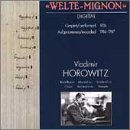| All Artists: Vladimir Horowitz Title: Vladimir Horowitz 1926 (Welte-Mignon Piano Rolls) Members Wishing: 0 Total Copies: 0 Label: Intercord Release Date: 4/16/1995 Genres: Dance & Electronic, Pop, Classical Styles: Vocal Pop, Opera & Classical Vocal, Chamber Music, Historical Periods, Baroque (c.1600-1750), Classical (c.1770-1830) Number of Discs: 1 SwapaCD Credits: 1 UPC: 754612086425 |
Search - Vladimir Horowitz :: Vladimir Horowitz 1926 (Welte-Mignon Piano Rolls)
 | Vladimir Horowitz Vladimir Horowitz 1926 (Welte-Mignon Piano Rolls) Genres: Dance & Electronic, Pop, Classical
|
Larger Image |
CD Details |
CD ReviewsThe 'frail drawing room lion' triumphs Aaron Oh Shuwen | SA, Australia | 12/29/2003 (5 out of 5 stars) "Pray tell me, jing zhuang, what is the title of this disc? Is it 'Vladimir Horowitz in DDD'? or 'The Welte-Mignon Piano Rolls'?. Tell me too, when was the Welte-Mignon player piano cutting edge technology? You mention it yourself - 1926. Then do enlighten me on why you complain about the 'outdated machine' and imply that the DDD label is deceiving. :rolleyes: The digital recording does its job well here - the miking is warm, intimate, and there is none of the surface noise or tape hiss associated with ADD recordings. The >sound< is immaculate. The actual >music" For serious Horowitz enthusiasts only Alex | London, United Kingdom | 08/15/2007 (3 out of 5 stars) "For the serious Horowitz enthusiast this recording is one of a small number of Holy Grails. The chance to hear Horowitz playing in 1926 when he was just starting to make his impact in Europe! But of course the piano rolls, clever as they were, had their severe limitations and so the magic Horowitz sound, the amazing pianissimos, the thundering fortes are all absent. Only in some of the runs do these recordings capture a little bit of the Horowitz glitter and sparkle.
Nevertheless, through the cumbersome rolls, through the mechanical and technical adjustments made in order to decipher the rolls, one can hear Horowitz's interpretation in terms of speed (hopefully reasonably accurately captured), overall conception and movement of melodic and harmonic lines. Some pieces are better captured than others. The Bach-Busoni is a disaster and you should listen to the recording of his May 1965 comeback concert instead for that piece. The Rachmaninoff G Minor Prelude is a shambles, the rhythm of the piece utterly lost by the piano rolls. The Liebesbotschaft is lovely and tenderly played although it's clear that it by no means sings in any way as it must have done live. The Chopin studies are good, although the Black Key study suffers a little from the same rhythmic problems as the Rachmaninoff. The Liszt Figaro fantasy is a long piece and can be extremely tedious as a result. Horowitz plays it with ease and mercifully makes a cut in the middle section. But again the dynamics and overall effect are rather lost, although there is still much to marvel at. The Chopin mazurkas are good too and Horowitz's Moment Exotique is great fun - these pieces are all well-captured. Overall, I am glad I bought this. As a historical record it is important. But for those who are not incurable Horowitz addicts the later recordings are light years better and you should probably save your money for them." |

 Track Listings (9) - Disc #1
Track Listings (9) - Disc #1